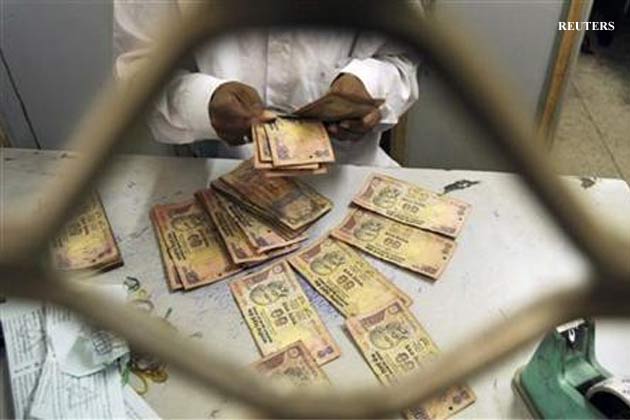
Mumbai, May 22: Continuing its free fall for the fifth day in a row, rupee set a new low of 55.47 before ending at 55.39 against the dollar on relentless demand for the American currency from importers, especially oil refiners, even as foreign fund flows remained muted.
At the Interbank Foreign Exchange (Forex) market, the domestic unit opened sharply higher at 54.60 per dollar from its last close of 55.03 on initial surge in stocks.
But soon dollar demand overshadowed the rupee sentiment even as other Asian currencies rose for a second day despite rating agency Fitch downgrading Japan's sovereign rating by one notch to A+ with a negative outlook.
Strong dollar demand from importers pulled rupee down to a low of 55.47. The domestic currency, which has lost over 11 per cent since March this year, today finally closed at 55.39, showing a fall of 0.65 per cent or 36 paise.
Forex dealers said for the second day in a row, there was no RBI role on Tuesday despite rupee touching new lows. They said capital inflows, the major driver behind rupee's appreciation, were absent in view of the global worries.
Data shows FIIs sold stocks worth Rs 283 crore on Tuesday. Indian stocks benchmark Sensex closed 157 points lower.
Moses Harding, head - ALCO and Economic & Market Research, IndusInd Bank said: "While there was genuine demand for dollars from importers, supply is not able to match the demand due to low capital flows."
On Monday, after the currency tumbled by 61 paise or 1.12 per cent, Reserve Bank of India (RBI) imposed restrictions of forward contracts by banks and arbitrage trading.
"Rupee also depreciated due to unwinding of positions today. Also, Monday's announcement by RBI has short-term negative impact," said T S Srinivasan, GM (Treasury), Indian Overseas Bank.
Finance minister Pranab Mukherjee in New Delhi said: "The government is taking a series of steps. However, managing rupee is market-related.... There is a lot of volatility.
"As and when RBI will consider necessary they will intervene. It depends on the market forces and market forces are uncertain," he said.
The dollar index, consisting of six major currencies, was up by nearly 0.4 per cent with investors looking ahead to a European Union leaders' meeting on Wednesday, as the bloc seeks to address the issue of Greece's possible exit from Eurozone.
Pramit Brahmbhatt, CEO, Alpari Financial Services (India) said, "The ongoing gilts auction and other expected OMOs (open market operations) can help the rupee to recover from its lows but the chances are grim as there has been pressure from global weakness."
Other experts also expect rupee's weakness to continue.
"With the expectation of further weakness, the exporter won't be very keen to sell the dollars in the near term whereas importers and ECB holders, buyers' credit takers, are coming in the market and hedging their short dollar positions," said Abhishek Goenka, CEO, India Forex Advisors.
Moses Harding, Head - ALCO and Economic & Market Research, IndusInd Bank, expects rupee to gain after reaching 57-level.
"Looking forward, over the near-term, we expect the rupee to remain volatile as further sovereign measures can be anticipated but can be absorbed by a negative stream of news flow from the Eurozone," said Anindya Banerjee, senior manager - currency derivatives, Kotak Securities.
The rupee premium for the forward dollar on Tuesday ended steady to better on sustained paying pressure from banks and corporates.
The benchmark six-month forward dollar premium payable in October finished at 156-1/2-158-1/2 paise from Monday's close of 156-158 paise while far-forward contracts maturing in April settled up at 284-286 paise from 280-282 paise.
The RBI fixed the reference rate for the US dollar at 54.8845 and for euro at 70.2093. The rupee declined further to 87.38 against the pound sterling from 87.00 previously and also remained weak against the euro to 70.68 from 70.25. However, it recovered against the Japanese yen to 69.36 per 100 from last close of 69.42.





Comments
Add new comment